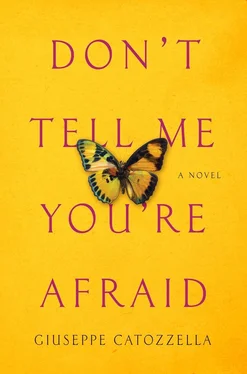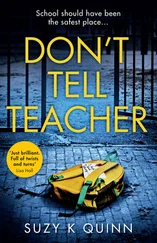SINCE HODAN HAD GONE, almost every night Alì came and played with me on the empty mattress.
Often he ended up falling asleep, then waking up suddenly and crossing the courtyard to go back to sleep in the room he shared with his father and brothers.
At first he consoled me over Hodan’s absence.
As soon as we finished eating, rather than stay outside in the courtyard and play as we had always done, we went into the bedroom and, in the moonlight, with the ferus turned off, we talked until my brothers and sisters came in. We talked mainly about the future, as we had when we were little and used to spend our afternoons in the eucalyptus tree. But we were older now, I could tell by Alì’s hands, which seemed huge to me. Alì saw me as a champion hailed around the world; he said that someday people from all corners of the globe would travel kilometers just to meet me, to have their picture taken with me and shake my hand. I laughed and couldn’t imagine such a thing. I said that if that were so, I would feel guilty: Traveling all that way just to meet me didn’t make sense. Then he grabbed my hand with those long, bony fingers of his, shook it, and said: “Can you picture all those people who’ll want to shake your hand, like I’m doing now?”
He, however, was not going to stay in Somalia. He told me he was going to do what Mo Farah had done. As soon as he was a little bigger, because you couldn’t make the Journey, as everyone called it, when you were eleven. It was too dangerous. He would go all the way to the uppermost part of Europe; for sure he wouldn’t stop at Italy or Greece.
Like Mo, he would go straight to England.
As he spoke, he stared at the photograph on the wall with a faraway look. A friend of his brother’s who had made the Journey had told him that in the countries of northern Europe, if you were a refugee fleeing from war they gave you a house and a stipend. But for Alì England was still the land of opportunity and besides, he said, it wasn’t as cold as in Finland or Sweden, where you could freeze to death when you went out shopping.
We always said the same things. Talking about our future reassured us; it made us feel good. Not just because we could occasionally hear the firing of nearby mortars from outside. No, it was just talking about it that mattered.
Alì loved to talk, and I loved listening to him. We loved the way the story had evolved since the first time it had come out of his mouth, the way it had settled on the things that he or I liked best. It was reassuring to know how it would end; it was a nice way to spend our evenings. Not quite like Hodan’s sweet voice, but almost. During those weeks, those months, Alì and I shared everything we had, generous and unafraid: We exchanged dreams.
And then there were times when we fought, when he said that someday, as a champion, I would want to leave my country. He could say anything, but not that. I knew that someday things would change, and I was sure that I would play an important role in that change. But Alì said that in the end I would give in, that I too would go to England and, like Mo Farah, I would run wearing the jersey of the country ruled by the queen. With that jersey I would win the Olympics.
He did it to infuriate me, and he succeeded. When he said that I would marry Mo and that we would be the most famous sports couple in the world, I tried not to lose my temper, but I couldn’t help it. I slapped him. He laughed and slapped me back. Then he pushed me on my back on the mattress, grabbed both of my arms, climbed astride me, pinned my wrists under his knees, and tickled me until I begged for mercy with tears in my eyes, imploring him to stop.
“Only if you admit that someday you’ll leave Somalia and marry Mo Farah,” he said as he continued tickling me to death.
“No!” I yelled.
“Then I won’t stop!”
At that point I couldn’t take it anymore and I gave in. “Okay, okay, all right, you win…. I’ll leave the country…”
“You’ll leave the country and…?”
“I’ll leave the country and… I’ll marry Mo Farah,” I gasped.
“You see? I was right!”
Then we burst out laughing and made up. Every now and then one of the adults, hearing our screams, stuck his head inside. Seeing us play, he said something we didn’t even hear and quietly went back to where he’d come from.
As we lay side by side, Alì sometimes began singing. I had told him that I liked it when Hodan sang, and to tease me he started wailing in falsetto, his voice pitched artificially high like a girl’s. But he was so out of tune that most times we started hitting each other and tickling again.
When we were together, Alì went back to being the way he’d always been. Only when he was with me did the melancholy that now always clouded his eyes fade.
I was worried about him.
I had tried many times to ask him what was wrong. I’d tried to talk about Ahmed, who hadn’t been seen at our house since the night I’d won the annual race; I reminded him of the encounter that long-ago evening when Ahmed had protected us from the two fundamentalist kids. But Alì never responded.
Just raising the subject made him darken even more. So he won and we didn’t talk about it.
We never talked about it, for two whole years.

BY DAY, HOWEVER, every day for two years Alì continued to be my coach. He had gone to the city’s old library and borrowed all the training manuals he could find. For months, every afternoon in the courtyard he forced me to read them to him. As a result, we also succeeded where we had failed a long time ago: Thanks to his passion for racing and training, Alì learned to read.
He always said that whereas the heart was the engine and breath the gasoline, the muscles were the pistons, and they had to be strong, resilient, and responsive.
In the courtyard in the afternoon or late at night, when the others were already in their rooms, he made me do reps, thirty-meter sprints, from one side to the other at maximum speed. As many as a hundred in a row. I started from the back wall and sprinted to the entrance wall. Then I turned around and did the same thing in reverse. Again and again, until I collapsed on the ground, utterly spent.
“Enough, please,” I begged him, exhausted, drenched with sweat.
“Samia, do you remember the first rule? Don’t complain and do everything I tell you,” Alì said, sitting in the shadows on the wicker chair Aabe used in the evening. I hated him.
“No. I said enough. I’m ready to drop.” I tried to move him to pity by throwing myself on the ground and pretending I was about to pass out.
At that point Alì made me get up, with the dust stuck all over me, and do another ten reps. Finally, a lap all around to cool down.
To strengthen my arm muscles, he’d made weights out of tin cans or plastic bottles he’d found in the street or at the Bakara market by filling them with sand. He liked going to the market; he loved being in crowded places with thousands of people all talking at the same time and scurrying around, jostling and shoving, bumping into one another like busy ants. I, on the other hand, didn’t like it at all. Not just because of the crowds, which I hated, and the reek of sweaty armpits that collected under the blue plastic awnings hung over the stalls to protect them from the scorching sun, but also because Bakara scared me. Not only was it the biggest market, but it was also the area of the city where most terrorist attacks occurred. Killers from the clans, as well as Al-Shabaab extremists, liked having all those people together.
I never wanted to go, whereas Alì, who wasn’t afraid of anything, found a thousand excuses to go back there.
Читать дальше





![Ally Carter - [Gallagher Girls 01] I'd Tell You I Love You But Then I'd Have to Kill You](/books/262179/ally-carter-gallagher-girls-01-i-d-tell-you-i-lo-thumb.webp)







